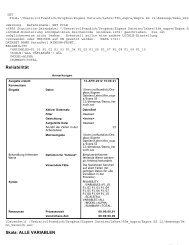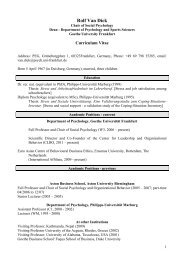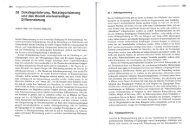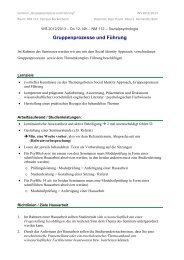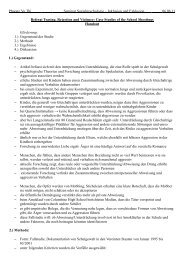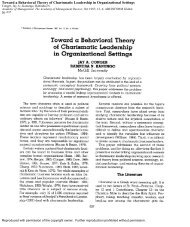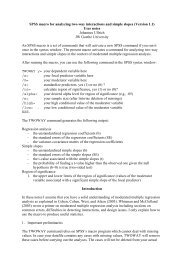Leadership-Interview-Transkript - Sozialpsychologie - Goethe ...
Leadership-Interview-Transkript - Sozialpsychologie - Goethe ...
Leadership-Interview-Transkript - Sozialpsychologie - Goethe ...
Erfolgreiche ePaper selbst erstellen
Machen Sie aus Ihren PDF Publikationen ein blätterbares Flipbook mit unserer einzigartigen Google optimierten e-Paper Software.
motivation and other kinds of processes. So it´s a very simple world in which there is little<br />
leadership. Anthropologistsyou know they study this and they say or they have documented in<br />
the very simplest of societies, foraging societies in which people were gathering and they<br />
lived in relatively small groups. In the simplest of those there is virtually no hierarchy. And so<br />
there is informal leadership, you could grow up and be a sort of responsible person and your<br />
adult life might be regarded as a wise woman or a wise man. But there is no chief, you know<br />
as when tribes got more complex. Evidently they needed leadership to coordinate the various<br />
activities and so they got to the level of chiefs. And then you should get more complex<br />
societies, there is many forms of leadership. So, I think it goes with social complexity, but<br />
even a small amount of complexity creates a need for leadership.<br />
Rolf van Dick: So, if we need leaders, what would you define as good leadership in these<br />
more or less complex worlds, societies, organizations? What differentiatesgood from not so<br />
good leaders?<br />
Alice Eagly: Right, well. If you look at the end product in the sense of that good leaders get<br />
the job done. So if it´s an organization, the organization functions well in the daily bases plus<br />
it has good outcome. Say if you are manufacturing automobiles, you´re manufacturing nice<br />
automobiles that people buy. Otherwise you fail, the organization will fail. Good leadership<br />
would have to create that positive outcome. For university successfully educate lots of<br />
students who go on very successfully in life. Then it has to work thought these processes<br />
whereby leaders understand how to design and coordinate these units and structures, how to<br />
motivate people, how to coordinate. So, leadership is certain multi-process-multi-functional in<br />
an organization. Leaders often inspire, they are good role models, they are able to motivate<br />
and mentor and to create conditions into which people in their organizations thrive in various<br />
ways, cause if they thrive they will be better workers, they will be better colleagues. So it is a<br />
complex task depending on the level of leadership as a small team versus a large organization.<br />
Rolf van Dick: But creating the right situation, the right structures, motivating people,<br />
inspiring people, if you think that´s the essence of good leadership…Do you think everyone<br />
can become a good leader? Is it trainable, learnable?<br />
Alice Eagly: I think it´s nature and nurture. You know, maybe that intrinsically some people<br />
are going to be…have more of the sort of temperamental qualities. They are more extrovert<br />
and maybe sort of they have agentic qualities. I think there is…everybody doesn't start out on<br />
the same ground, but then there is a lot of success in formally and informally training people.<br />
Of cause people in modern organizations may have leadership training going on that´s rather<br />
formal but I think in the larger world people often learn to by example. You know there were<br />
in an organization and they saw somebody doing it in a way that seems to work and then they<br />
sort of model themselves after that person. And so if you have none of that, if you haven't had<br />
formal training or you haven´t sort of observed leadership worth the pain in ways that was<br />
positive than it´s maybe sort of hard even if you are sufficiently sort of temperamentally<br />
suited. So I think it´s nature and nurture and then it´s pretty trainable. But then you can´t<br />
make anyone into a star.<br />
Rolf van Dick: So, we talked about role models that we need. Who has inspired you? Who<br />
have you encountered that was a model for you in terms of good leadership?<br />
Alice Eagly: Well, I´m a professor, so the only real leadership role I ´ve held, a formal role<br />
was as the head of a department of psychology, you know the whole department of<br />
psychology. So it´s managerial not high in the structure of university but nonetheless




